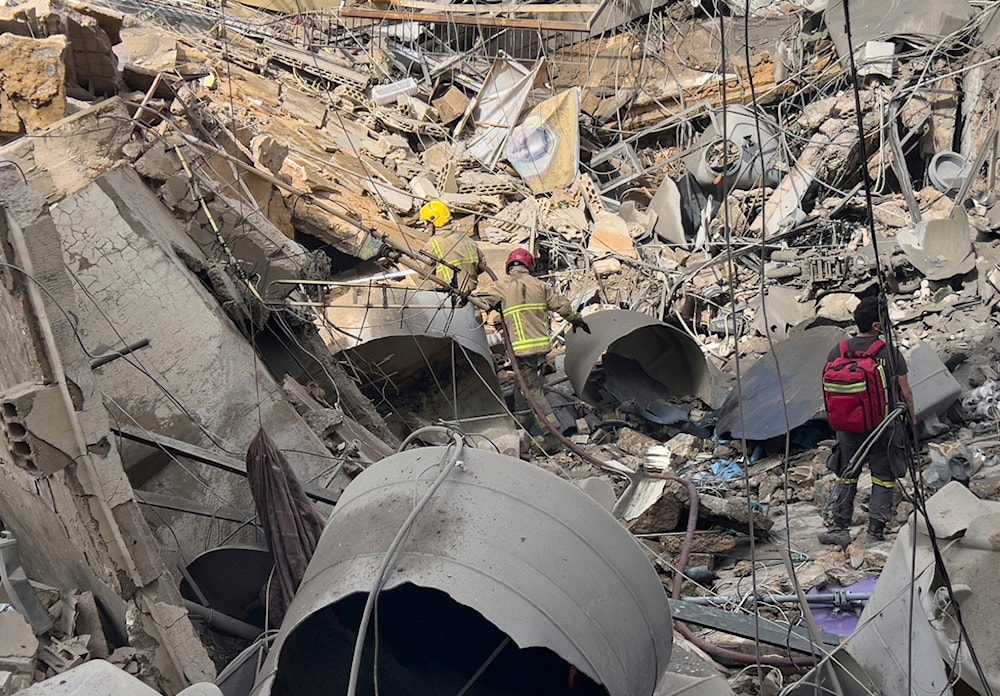Netanyahu, Katz threaten 'all of Lebanon' as Hezbollah upholds truce
Israeli Security Minister Katz insisted that the Lebanese government bears full responsibility for any rocket fire, regardless of the source.
-

Rescue workers work on the rubble of a destroyed building that was hit by an Israeli airstrike in Dahiyeh, in the southern suburb of Beirut, Lebanon, Friday, March 28, 2025. (AP)
Israeli Security Minister Israel Katz on Friday escalated his rhetoric against Lebanon, threatening direct strikes on Beirut following claims that two rockets had been launched from Lebanese territory toward northern occupied Palestine. One rocket was intercepted, while the other reportedly fell short inside Lebanon.
Earlier in the day, Israeli media reported two explosions in Kiryat Shmona. Katz used the incident to justify renewed threats, stating: "If there is no calm in Kiryat Shmona and Galilee's settlements, then there will be no calm in Beirut."
"We will not allow the return of the reality of October 7… we will guarantee the security of Galilee's residents, and we will work against every threat." He further insisted that the Lebanese government bears full responsibility for any rocket fire, regardless of the source.
Prime Minister Benjamin Netanyahu reinforced this posture, declaring that "Israel" would continue to strike "anywhere in Lebanon" in response to what it deems as threats, stating clearly that military operations would not be confined to the border areas.
Despite the accusations, Hezbollah denied any role in the rocket fire, reaffirming its continued commitment to the ceasefire brokered in November 2024.
Read more: Hezbollah says rockets fired an 'Israeli pretext to resume aggression'
The Israeli occupation forces have been intensifying their assault across southern Lebanon, launching repeated airstrikes, drone attacks, and shelling.
An Al Mayadeen correspondent reported that areas such as Kfarsir, Qaaqaiyat al-Jisr, and al-Khiam were hit on Friday, with white phosphorus munitions reportedly used near the eastern edge of al-Khiam.
Drone strikes have also proven deadly. On Thursday, an Israeli drone targeted a vehicle in Bara'achit, killing two civilians, according to Lebanon's Ministry of Health. The same day, artillery and drone fire killed three people in Yohmor al-Shaqif and one more in Maaroub, southern Lebanon.
Relentless Aggression
Since the ceasefire agreement in November, Israeli military action has reportedly killed at least 106 people and injured over 300 in Lebanon, in what observers describe as systematic violations of the truce.
Calls for escalation came from within "Israel" as well. David Azulai, the mayor of Metulla, urged the occupation to annul UN Resolution 1701, which ended the 2006 war on Lebanon. "This is exactly what we fear," he said. "We will not allow this and will not agree to this."
Despite the continued provocations and attacks, Hezbollah maintains its position that it is not seeking to escalate, but warns that ongoing violations may force a response. Observers note that Israeli threats and operations appear aimed at creating justification for further aggression, as the military continues targeting Lebanon almost daily.

 3 Min Read
3 Min Read








